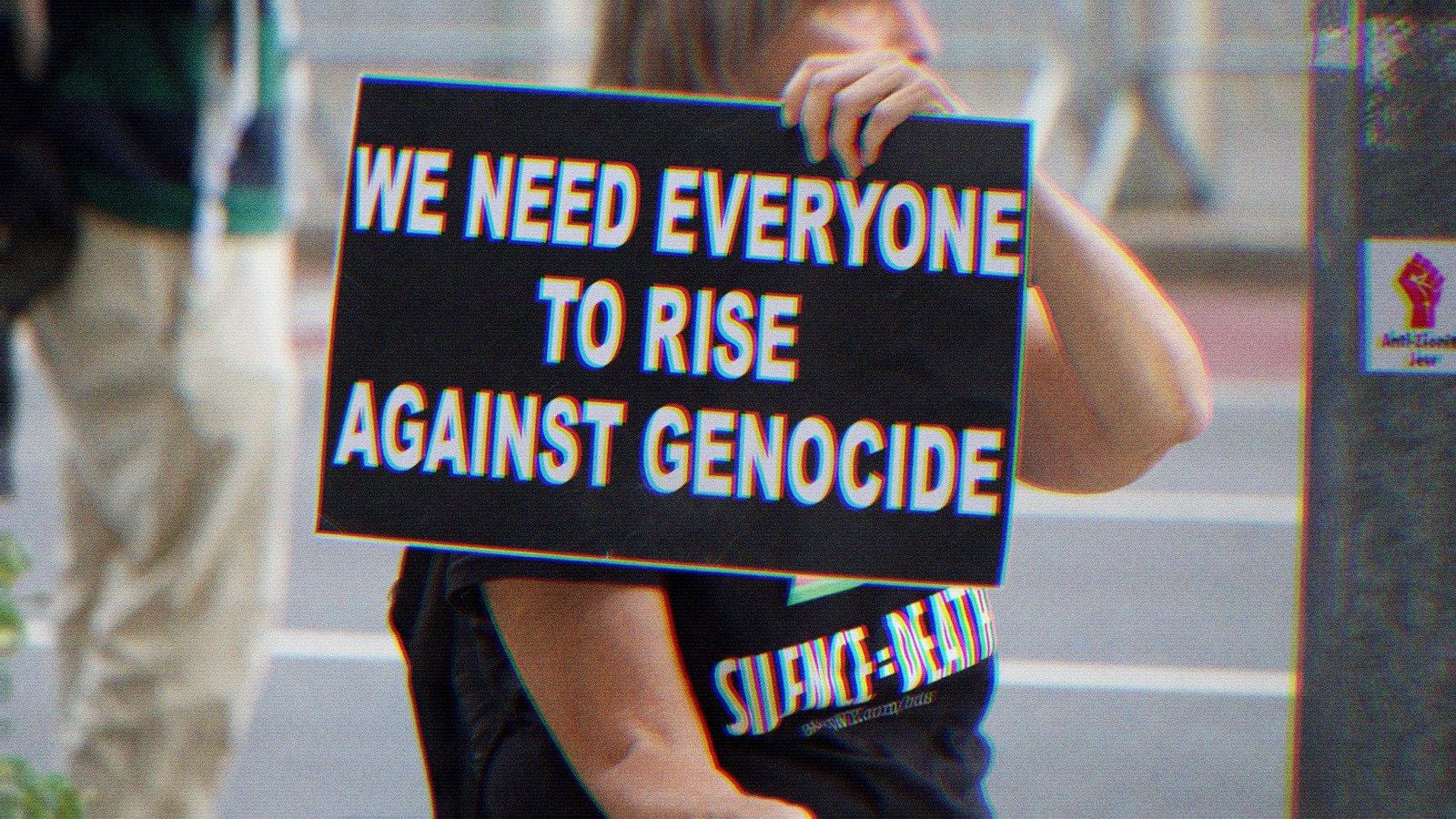Losing the Narrative: U.S. Public Support for Israel Craters Amid Gaza Genocide
 Image Description: A person holding a sign that says 'We need everyone to rise against genocide.'
Image Description: A person holding a sign that says 'We need everyone to rise against genocide.'
This essay appeared in the Sept. 30, 2025 edition of UNFTR’s premium newsletter. Become a UNFTR member to receive our bonus newsletter each week and for other perks.
The New York Times/Siena poll released on Tuesday offered a wide-ranging look at American politics, most notably President Trump’s dreadful approval rating, which has dropped 9 percent since he returned to office in January—from 52 to 43 percent.
However you slice it, the results aren’t great, with only a third of Americans saying they believe the current political system (which you definitely cannot criticize) can remedy the country’s many problems. Alas, who can blame them?
In a sign that the duopoly rules everything around us, nearly identical percentages (18 percent of Democrats and 16 percent of Republicans) said the competing party is the “most important problem” the country is contending with—not capitalism, oligarchy (also see: corruption), or money in politics (sense a trend?). It’s you, your neighbor, your kid’s teacher—anyone with a divergent viewpoint on a set of policies foisted upon us by political organizations that collaborate with other powerful people to consolidate wealth for the betterment of elite-kind.
In short, pessimism abounds. But if you’re desperate for a sliver of hope from such a survey—to the extent that the purported data matches reality—look no further than Americans’ 180-degree turn on “Israel-Palestine.” as the mainstream dubs it.
Per the Times: “Disapproval of the war appears to have prompted a striking reassessment by American voters of their broader sympathies in the decades-old conflict in the region, with slightly more voters siding with Palestinians over Israelis for the first time since The Times began asking voters about their sympathies in 1998.”
It goes without saying that the reversal in opinions is stark, especially when you consider that for years being pro-Palestine was conflated with extremism, that people and organizations were blacklisted for boycotting Israel over its siege and occupation of Gaza, and reflexive denunciations and accusations of anti-semitism were hurled toward anyone mildly critical of Israel’s government. The dramatic swing is considerably more revealing when you take into account the massive amount of goodwill Israel had received after Oct. 7, 2023.
According to the Times/Siena poll, the number of people who believe Israel is “intentionally” killing civilians has nearly doubled from 22 percent in December 2023 to 40 percent this month. In terms of who they support, 35 percent said Palestinians and 34 percent said Israel—a significant shift from the 47-20 percent advantage Israel had in the weeks and months following October 7.
In addition, a majority of Americans oppose providing more economic and military aid to Israel, and 58 percent feel Israel “should stop its military campaign in order to protect against civilian casualties, even if not all Israeli hostages have been released.”
As for the question about the killing of civilians, majorities across every age group believe Israel is “intentionally” slaying Palestinians rather than “unintentionally” doing so:
- 18-29: 66-9 percent
- 30-44: 46-19 percent
- 45-64: 33-16 percent
- 65+: 30-20 percent
That’s damning.
Yet the findings come as corporate Democrats couldn’t care less about Palestinians and amid a Trump-brokered plan to subjugate Palestinians under the guise of ending hostilities.
Jeremy Scahill, as usual, has an incredibly comprehensive breakdown of the plan offered by Israel and the United States (no Palestinians were consulted in the making of this plan). Here’s his characterization of the “proposal:”
“While Trump praised his own plan as a landmark opportunity for ‘eternal peace in the Middle East,’ the exclusion of all Palestinians from the process is an extension of decades of Western colonial dominance of decision-making surrounding the future of Palestine. At the heart of Trump’s plan is a thinly-veiled ultimatum to Palestinians: bend the knee to Israel, renounce the right of armed resistance, and agree to indefinite subjugation by foreign actors.”
Scahill also quoted Sami Al-Arian, the director of the Center for Islam and Global Affairs at Istanbul Zaim University, who astutely pointed out: “This plan is a malicious attempt to achieve through politics what the war of extermination could not achieve on the ground. This includes ending the resistance, withdrawing weapons, releasing [Israeli] captives without a complete withdrawal, maintaining security, political, and economic control over Gaza, and imposing international tutelage.”
Just last week, Israeli Prime Minister Benjamin Netanyahu delivered a speech at the United Nations General Assembly in front of a sparse crowd after dozens of delegates participated in an organized walk-out.
Later that day, Netanyahu, a fugitive who has thus far evaded an open International Criminal Court (ICC) arrest warrant for war crimes, met with so-called “pro-Israel influencers” to discuss efforts to shape the discourse on social media, which he referred to as a “tool of battle.”
One such option in the propaganda arsenal, TikTok, is in the midst of a sale to a joint venture involving major players in the United States, including Oracle, owned by billionaire Larry Ellison, a staunch ally of Israel. Ellison, whose company will have an outsized role in the popular app’s underlying tech, is himself a major donor to the IDF through the organization “Friends of the Israel Defense Forces.” The TikTok deal is the “most important purchase that is going on,” Netanyahu told the assembled influencers.
Netanyahu, as he admits, is fighting a multi-front war against Palestinians. Among the players on the chessboard is the U.S. public, which he often tries to influence personally through softball interviews in American media. Tellingly, when Netanyahu addressed his own citizens on the ostensible “peace” plan, he dropped all pretense that this would lead to the end of active hostilities.
“Who would have believed this? After all, people constantly say, the IDF should withdraw…No way, that’s not happening,” he said.
The campaign to win hearts and minds is at full tilt. However, many Americans have shifted their perspective as they’ve seen the livestreamed genocide play out—and that’s with considerable institutional backing of Israel.
Netanyahu is clearly aware of the changing dynamics. It’s a reason why he sees our social platforms as crucial to his war of annihilation. And it also explains why he’s so invested in the TikTok deal. But Israel isn’t sitting back. Just this month, Trump’s former campaign manager, Brad Parscale, registered as a foreign agent after striking a $6 million deal to message on behalf of Israel. The contract stipulates that “at least 80 percent of content is tailored to Gen Z audiences across platforms, including TikTok, Instagram, YouTube, podcasts, and other relevant digital and broadcast outlets.”
All of this to ensure a genocide continues. But Americans seemingly have built up antibodies protecting them against infectious propaganda campaigns, at least when it comes to the suffering of Palestinians.
As one 39-year-old woman from Hartford, Conn. told the Times: “As a mother, seeing those children is horrifying. This isn’t a war. It’s a genocide.”
Image Source
- Drew, Pamela “UN 377A Gaza Whistleblowers” Flickr, 16 September 2025. CC BY-NC 4.0. Changes were made.
Rashed Mian is the managing editor of the award-winning News Beat podcast and co-founder of the newly launched Free The Press (FTP) Substack newsletter. Throughout his career, he has reported on a wide range of issues, with a particular focus on civil liberties, systemic injustice and U.S. hegemony. You can find Rashed on X @rashedmian and on Bluesky @rashedmian.bsky.social.


